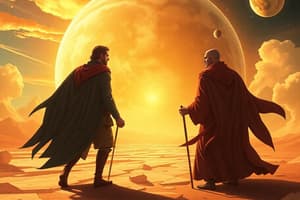Podcast
Questions and Answers
Match the concepts in international relations with their definitions:
Match the concepts in international relations with their definitions:
Reality Theory = Focuses on the tangible and measurable aspects of international relations System Theory = Studies the interactions and relationships within a system of states Decision Making = The process of choosing among alternatives in international affairs Game Theory = Analyzes strategic interactions where the outcomes depend on the actions of multiple agents
Match the theories to their main emphasis in international relations:
Match the theories to their main emphasis in international relations:
Reality Theory = Empirical data and real-world contexts Game Theory = Strategic behavior and competition among actors Decision Making = Cognitive processes of leaders and entities System Theory = Holistic view of international interactions
Match the principle with its corresponding aspect in international relations:
Match the principle with its corresponding aspect in international relations:
Game Theory = Models of conflict resolution System Theory = Order and patterns in international behavior Decision Making = Rational choice and preferences Reality Theory = Objective measurements in state behavior
Match the following theories to their respective applications:
Match the following theories to their respective applications:
Match each theory to its key proponents or contributors:
Match each theory to its key proponents or contributors:
Flashcards
Principles of International Relations
Principles of International Relations
Explores how the actions of individuals, states, and organizations shape global interactions. It focuses on factors like power dynamics, diplomacy, and the role of international institutions in shaping global outcomes.
System Theory
System Theory
Also known as "Waltz's Theory", this theory emphasizes the importance of the international system in shaping state behavior. It posits that states are primary actors in a system characterized by anarchy (lack of central authority) and security competition.
Decision Making
Decision Making
Focuses on the cognitive processes and psychological factors that influence how individuals make decisions in international affairs. It examines biases, perceptions, and the complexities of decision-making under stress.
Game Theory
Game Theory
Signup and view all the flashcards
Reality Theory
Reality Theory
Signup and view all the flashcards
Study Notes
Definition and Scope of International Relations
- International relations (IR) is a field of study that examines the interactions between states and other actors in the international system.
- It encompasses a wide range of issues, including war and peace, trade, diplomacy, human rights, and environmental protection.
- Key actors include states, international organizations, non-governmental organizations, and individuals.
Reality Theory
- Reality theory posits that power dynamics and the pursuit of national interest are fundamental drivers of international relations.
- It emphasizes the importance of understanding the inherent conflicts and competition that exist among states in an anarchic international system.
- Key features include:
- The concept of anarchy: the absence of a world government or overarching authority.
- The importance of national interest: states prioritize their own survival and well-being.
- Power politics: states engage in power struggles and alliances to achieve their goals.
- Security dilemma: actions taken by one state to enhance its security can be perceived as threatening by other states, leading to a security spiral.
System Theory
- System theory provides a framework for understanding the interconnectedness of actors and processes within the international system.
- It emphasizes the concepts of structure, agency, and interdependence.
- Key features include:
- Structure: the overarching rules, norms, and institutions that shape state interaction.
- Agency: the ability of individual states and other actors to act and influence the system.
- Interdependence: the interconnectedness of states through trade, diplomacy, and other interactions.
- Feedback loops: how actions and decisions within the system generate responses and further actions.
- Levels of analysis (e.g., international, national, individual).
Decision-Making Theory
- Decision-making theory focuses on how decision-makers within states arrive at decisions regarding foreign policy.
- It recognizes that individual decision-makers and their perceptions shape how states interact in the international system.
- Factors that influence decision-making include:
- Cognitive biases: mental shortcuts and errors in judgment that can affect decision-making.
- Groupthink: pressures within groups to conform to prevailing norms, suppressing dissenting views.
- Bureaucratic politics: the influence of different government agencies and actors on the decision-making process.
- Public opinion: shaping or constraining decision-makers' foreign policy actions.
Game Theory
- Game theory is a mathematical framework used to model strategic interactions among rational actors.
- It analyzes how actors' choices affect the outcomes of specific situations.
- It helps by identifying dominant strategies, potential Nash equilibria, and mechanisms for cooperation or conflict.
- Key concepts include:
- Rationality: actors are assumed to make choices that maximize their utility.
- Payoffs: the outcomes or rewards associated with different choices.
- Strategies: the courses of action available to actors.
- Zero-sum games: where one actor's gain is another's loss.
- Non-zero-sum games: where outcomes can be mutually beneficial.
- Examples of applications include prisoner's dilemma, arms races, and international trade negotiations.
Studying That Suits You
Use AI to generate personalized quizzes and flashcards to suit your learning preferences.




